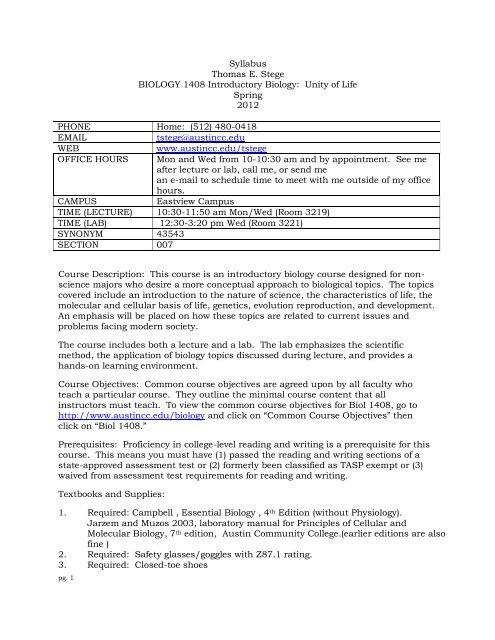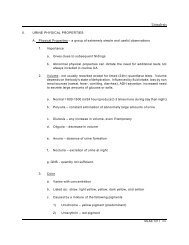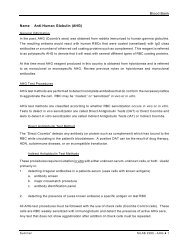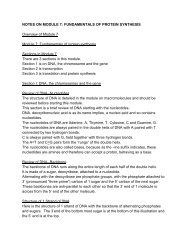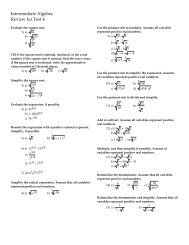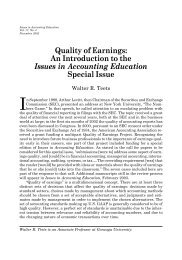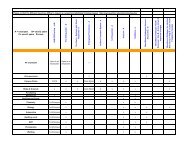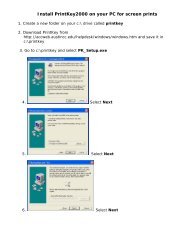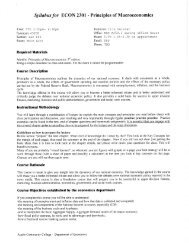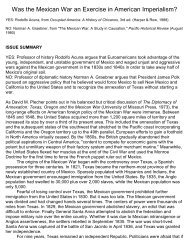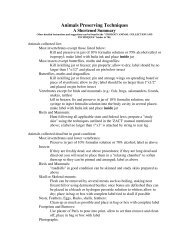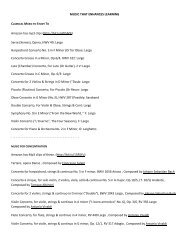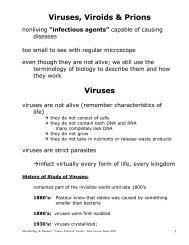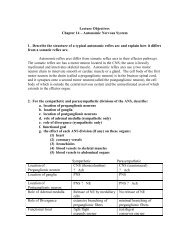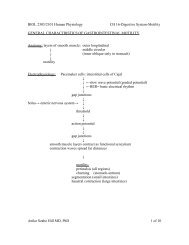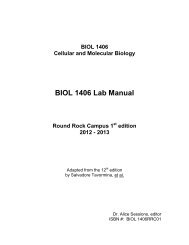Syllabus Thomas E. Stege BIOLOGY 1408 Introductory Biology ...
Syllabus Thomas E. Stege BIOLOGY 1408 Introductory Biology ...
Syllabus Thomas E. Stege BIOLOGY 1408 Introductory Biology ...
You also want an ePaper? Increase the reach of your titles
YUMPU automatically turns print PDFs into web optimized ePapers that Google loves.
pg. 1<br />
<strong>Syllabus</strong><br />
<strong>Thomas</strong> E. <strong>Stege</strong><br />
<strong>BIOLOGY</strong> <strong>1408</strong> <strong>Introductory</strong> <strong>Biology</strong>: Unity of Life<br />
Spring<br />
2012<br />
PHONE Home: (512) 480-0418<br />
EMAIL tstege@austincc.edu<br />
WEB www.austincc.edu/tstege<br />
OFFICE HOURS Mon and Wed from 10-10:30 am and by appointment. See me<br />
after lecture or lab, call me, or send me<br />
an e-mail to schedule time to meet with me outside of my office<br />
hours.<br />
CAMPUS Eastview Campus<br />
TIME (LECTURE) 10:30-11:50 am Mon/Wed (Room 3219)<br />
TIME (LAB) 12:30-3:20 pm Wed (Room 3221)<br />
SYNONYM 43543<br />
SECTION 007<br />
Course Description: This course is an introductory biology course designed for non-<br />
science majors who desire a more conceptual approach to biological topics. The topics<br />
covered include an introduction to the nature of science, the characteristics of life, the<br />
molecular and cellular basis of life, genetics, evolution reproduction, and development.<br />
An emphasis will be placed on how these topics are related to current issues and<br />
problems facing modern society.<br />
The course includes both a lecture and a lab. The lab emphasizes the scientific<br />
method, the application of biology topics discussed during lecture, and provides a<br />
hands-on learning environment.<br />
Course Objectives: Common course objectives are agreed upon by all faculty who<br />
teach a particular course. They outline the minimal course content that all<br />
instructors must teach. To view the common course objectives for Biol <strong>1408</strong>, go to<br />
http://www.austincc.edu/biology and click on “Common Course Objectives” then<br />
click on “Biol <strong>1408</strong>.”<br />
Prerequisites: Proficiency in college-level reading and writing is a prerequisite for this<br />
course. This means you must have (1) passed the reading and writing sections of a<br />
state-approved assessment test or (2) formerly been classified as TASP exempt or (3)<br />
waived from assessment test requirements for reading and writing.<br />
Textbooks and Supplies:<br />
1. Required: Campbell , Essential <strong>Biology</strong> , 4 th Edition (without Physiology).<br />
Jarzem and Muzos 2003, laboratory manual for Principles of Cellular and<br />
Molecular <strong>Biology</strong>, 7 th edition, Austin Community College.(earlier editions are also<br />
fine )<br />
2. Required: Safety glasses/goggles with Z87.1 rating.<br />
3. Required: Closed-toe shoes
4. Recommended: 1 1/2 inch three-ring binder and tab dividers (to keep lecture<br />
and lab notes and materials). Suggested tab divider labels: Schedule, <strong>Syllabus</strong>,<br />
Lecture Notes/Handouts, Lab Handouts, and Lecture Assignments.<br />
Attendance: You are responsible for attending all lectures and lab. Most students do<br />
better on the exams if they attend regularly. You are responsible for all materials,<br />
activities, assignments, or announcements covered in class, regardless of your reason<br />
for being absent. If you do miss a class, it is your responsibility to get lecture notes<br />
from someone in the class and to get handouts and assignments. Lecture and lab<br />
attendance will be informally monitored, however lab attendance and report points are<br />
given only to students in attendance. If your percent grade is within 0.5 percentage<br />
points of a letter grade, your final letter grade will be determined by your attendance<br />
AND participation in lecture and lab.<br />
Expectations:<br />
pg. 2<br />
• Spend a minimum of 2 hours outside of class for every hour spent in class (12<br />
hours of study time outside of class per week). Most students need to spend<br />
MUCH MORE time to obtain a grade higher than a C. Short study periods every<br />
day are much more effective than one long study session.<br />
• Be prepared for each lecture. The course schedule indicates the lecture reading<br />
assignments. Read the Chapter Review found at the end of each chapter<br />
BEFORE coming to class. Also scan all figures and read the figure captions<br />
BEFORE coming to class.<br />
• Read the sections covered in lecture and answer the pertinent questions at the<br />
end of each chapter as soon as possible AFTER each lecture.<br />
• Be prepared for each lab. You are expected to read through the entire lab<br />
handout BEFORE coming to lab. This will help you to pace yourself to complete<br />
the objectives in the time allotted and help you to better understand the terms<br />
and concepts covered in the lab BEFORE coming to lab.<br />
• Actively participate in all lecture and lab activities.<br />
• Come see me if you need help. You can also try a tutor at the Learning Lab or<br />
form a study group (3 people per group is the maximum recommended).<br />
• Clean up and store materials before leaving lab. See specifics below.<br />
Cell Phones and Pagers: Please turn off cell phones during class as a courtesy to me<br />
and other students.<br />
ACC Policy Concerning Copyrighted Materials: All class materials provided on the<br />
instructor’s web page. Blackboard, CD, and/or in printed form (lab, objectives,<br />
assignments, etc.) are copyrighted and may not be reproduced without the written<br />
consent of the copyright holder (this may be the instructor, ACC, or a publisher).<br />
Reproduction consists of photocopying, scanning and copying files, or posting on a<br />
server or web site. Students currently registered for this section have permission to<br />
print one copy of course materials for their own personal use. No permission is given<br />
for posting any course materials on web sites.<br />
Grades:
Lecture Exams: You will have 4 lecture exams. The exams are worth 100 pts each.<br />
The questions will include: multiple choice, short-answer (essay), and problem solving.<br />
I will grade and return exams to you within one week.<br />
Lecture Assignments: You will have 3 lecture assignments during the semester.<br />
Each assignment is worth 30 pts. Assignments submitted after the deadline will be<br />
considered late. If you submit work after the deadline, the total grade will be reduced<br />
by one letter grade for each class it is late.<br />
Lab Reports: You are required to attend all labs on Wednesdays from 12:30-3:20<br />
pm. You will earn 4 points for every lab you attend for 60 total points.<br />
Lab Practical Exams: You will have 2 lab practical exams. Each lab practical exam<br />
is worth 25 pts. The lab objectives listed on each lab handout will guide you as to<br />
what material will be covered on the lab practical exam.<br />
Lab Cleanup: Please clean up and store all materials before leaving the lab. This is<br />
what I expect.<br />
1. Put away all slides, microscopes, models, books, charts, and specimens. Put<br />
the models back together before putting them away.<br />
2. When putting away microscopes:<br />
a. Put the lowest power objective in place and lower the noisepiece.<br />
b. Remove any microscope slide.<br />
c. Turn off the microscope before unplugging the cord.<br />
d. Use the Velcro strap to wrap the electrical cord.<br />
e. Return the microscope to the proper location in the cabinet.<br />
3. Wash and dry glassware as directed.<br />
4. Dispose of liquid and solid wastes as directed.<br />
5. Use the spray provided in lab to clean your lab table and all counters used.<br />
6. Wash your hands before leaving the lab.<br />
Makeup/Retests Exams: You MUST contact me as soon as possible if you must miss a<br />
lecture exam. Only one makeup lecture exam will be given to any student during<br />
the semester.<br />
There are NO retest exams. Once you take an exam, you may not take it again to try<br />
for a better grade.<br />
Curves and Extra Credit: There will be NO curve on any of the exams, etc. during the<br />
semester. There will be NO curve on any of the final course grades. There will be NO<br />
separate extra credit assignments.<br />
pg. 3
Tracking Your Grades: Due to ACC policies concerning the Family Education Rights<br />
and Privacy Act (FERPA), I cannot post grades or call or email you with information<br />
about your grades. You can keep track of your grades in the space on this page.<br />
Lecture Exams<br />
pg. 4<br />
(100 pts)<br />
(100 pts)<br />
(100 pts)<br />
Lecture<br />
Assignments<br />
1. (30 pts)<br />
2. (30 pts)<br />
3. (30 pts)<br />
Lab Attendance<br />
4 point each lab<br />
Total points = 60<br />
Total Lecture Exams (Maximum of 400 pts)<br />
Total Lecture Assignments (Maximum of 90 pts)<br />
Total Lab Reports (Maximum of 60 pts)<br />
Total Lab Practicals (Maximum of 50 pts)<br />
Grand Total (Maximum of 600 pts)<br />
Lab Practical Exams<br />
1. (25 pts)<br />
2. (25 pts)<br />
Divide your grand total by 600 pts than multiply by 100 to get your percentage grade.<br />
For example: 540/600 pts x 100 = 90%<br />
A = 90 – 100%<br />
B = 80 – 89%<br />
C = 70 – 79%<br />
D = 60 – 69%<br />
F = 0 – 59%<br />
Lab Safety<br />
“Health and safety are paramount values in science classrooms, laboratories and field<br />
activities. Students are expected to learn, understand, and comply with environment “<br />
Any labs involving chemicals require the use of safety glasses or goggles and closed-up<br />
toe shoes. You must have these safety items to participate in the lab.<br />
Student Insurance: Students enrolled in lab are covered by student insurance if they<br />
are injured as a result of the lab. If you are injured, I will give you a student<br />
insurance form to take with you to the medical facility where you will be treated.<br />
There is a $25 deductible.<br />
Support Services: The lab room is available for student use during certain hours of<br />
the week. The lab rooms at other campuses are also open during the week and on<br />
weekends. Usually an instructor is available to tutor students in the open labs.
Finally, most semesters a biology tutor is available in the Learning Lab at this campus<br />
and others. For Learning Lab hours and more information about tutoring services, go<br />
to http://www2.austincc.edu/tutor/index.php.<br />
Withdrawal Policy: The instructor has the right, but not the responsibility, to drop you<br />
from the course for excessive absences. You are responsible for monitoring your<br />
progress in the course and determining if you need to withdraw. I can help you make<br />
the decision, but the final decision is yours. You can withdraw by filling out the<br />
appropriate form and submitting it to the ACC Admissions and Records office on any<br />
campus before the stated deadline. You do not need my signature on this form. The<br />
last day to withdraw for the semester is APRIL 23,2012 . If you stop attending class<br />
and do not withdraw yourself from the course, you will end up with a grade of F for<br />
the semester.<br />
You should be aware of the Texas law before you decide to drop: Students who<br />
entered a Texas public college for the first time in or after the fall of 1999 are subject<br />
to a Texas statute that limits the number of courses a student may take for which the<br />
state will pay the college. At the community college, the limit is 1.5 times the credits<br />
required for the two-year degree. Students who exceed the number of credits required<br />
for a degree by 50% may be charged additional fees. Courses for which students<br />
receive a grade of W (withdrawal) are included in the total credits calculation.<br />
Developmental courses are not included in the total credits calculation. This rule<br />
applies to university students and to community college students who transfer from<br />
ACC to Texas public college and universities. Students who leave ACC with excess<br />
hours may have to take fewer courses at the Texas institution to which they transfer<br />
or pay higher tuition for the extra hours.<br />
It is now Texas law that a student may only drop a maximum of 6 (SIX) courses during<br />
their undergraduate studies. If you drop more than 6 courses and drop any<br />
subsequent courses, you will receive an “F” for those courses and will not be allowed<br />
to withdraw or drop and thereafter…<br />
Incomplete Grades: Incomplete grades are rarely given in this class and will be given<br />
entirely at my discretion. A grade of incomplete (I) will be assigned only if:<br />
pg. 5<br />
• You have a valid reason and I agree to give an incomplete grade.<br />
• You request a grade of I in writing, with written documentation.<br />
• You have completed at least 60% of the course work.<br />
• You have at least a C (70%) average on completed work.<br />
• The reason for your request has occurred after the official drop deadline for the<br />
course.<br />
• You provide all documentation and sign the required form prior to the last day<br />
of the class.<br />
Be aware that incompletes that are not finished convert to F grades automatically,<br />
regardless of your grade average when you request the incomplete.
OFFICIAL <strong>BIOLOGY</strong> DEPARTMENT POLICY CONCERNING STUDENT USE OF ORGANISMS IN THE<br />
CLASSROOM AND LABORATORY: Most ACC biology classes, particularly those with<br />
laboratory components, use actual organisms during instruction in addition to images<br />
and models. ACC students generally are preparing for real world careers requiring<br />
workers with hands-on experience. These careers include health care, veterinary<br />
work, horticultural and agricultural work. Other students plan to transfer to four-<br />
year colleges and will be participating in biological research where hands-on<br />
experience is equally important. Organisms used at ACC are fundamental in biology<br />
instruction and they are utilized to teach specific skills and knowledge. Their<br />
condition and usage varies from course to course. Students will be expected to<br />
actively participate in these activities. Student with particular concerns in this matter<br />
should consult with their instructor and/or departmental officials before enrolling in a<br />
laboratory course so that they can know what will be required of them. Some<br />
organisms are observed alive while others are dead and preserved in various ways.<br />
Student manipulation of organisms ranges from culturing living organisms to<br />
dissecting preserved ones. Some examples include, but are not limited to: bacterial<br />
culturing for microbiology courses: cat, pig or rat dissection for anatomy course<br />
within the time remaining in the semester, and the instructor must have<br />
documentation that the student is eligible to be reinstated in the course.<br />
Scholastic Dishonesty: “Acts prohibited by the college for which discipline may be<br />
administered include scholastic dishonesty, including but not limited to cheating on<br />
an exam or quiz, plagiarizing and unauthorized collaboration with another in<br />
preparing outside work. Academic work submitted by students shall be the result of<br />
their thought, research, or self-expression. Academic work is defined as, but not<br />
limited to tests, quizzes, whether taken electronically or on paper; projects , either<br />
individual or groupl; classroom presentations, and homework.” (Student Handbook, p.<br />
30).<br />
To avoid any problems that may arise from misunderstandings, you should follow<br />
these procedures during lecture exams and lab practical exams:<br />
pg. 6<br />
• Turn off and store all cell phones<br />
• Store all personal belongings under your desk.<br />
• Close all books and notebooks and make sure there are no loose papers visible.<br />
• Keep your eyes on your own papers.<br />
• Remove your hat while taking the exam.<br />
• Do not talk during exams.<br />
• If you expect to need tissues or medications, get them out before the exam and<br />
leave them on your desk.<br />
• Keep your exam answer sheet covered so it is not visible to the other students.<br />
• Do not leave the room until you have finished the exam.<br />
Students with Disabilities: “Each ACC campus offers support services for students<br />
with documented physical or psychological disabilities. Students with disabilities<br />
must request reasonable accommodations through the Office of Students with<br />
Disabilities on the campus where they expect to take the majority of their classes.<br />
Students are encouraged to do this three weeks before the start of the semester.”
Students who are requesting accommodations MUST provide the instructor with a<br />
letter of accommodations from the Office of Students with Disabilities (OSD) at the<br />
beginning of the semester.<br />
Accommodations can only be made after the instructor receives the letter of<br />
accommodations from OSD.<br />
Academic Freedom: “Each student is strongly encouraged to participate in class. In<br />
any classroom situation that includes discussion and critical thinking, there are<br />
bound to be many differing viewpoints. These differences enhance the learning<br />
experience and create an atmosphere where students and instructors alike will be<br />
encouraged to think and learn. On sensitive and volatile topics, students may<br />
sometimes disagree not only with each other but also with the instructor. It is<br />
expected that faculty and students will respect the views of others when expressed in<br />
classroom discussions.”<br />
Testing Center Policy: ACC Testing Center policies can be found at:<br />
http://www.austincc.ed/testcr/<br />
Other Student Services: Information about other services for students, such<br />
as financial aid, counseling and grade reports, can be found at:<br />
pg. 7<br />
• Student Services web site:<br />
http://www.austincc.edu/resources_students/services.php<br />
• The ACC student handbook: http://www.austincc.edu/handbook/useful.htm<br />
Instructional Services: Information about instructional services (e.g. libraries)<br />
located at this campus can be found at: http://library.austincc.edu/
Tips for Success in <strong>Biology</strong> <strong>1408</strong> – <strong>Introductory</strong> <strong>Biology</strong>: Unity of Life<br />
1. Come to Class!<br />
There is no substitute for being present in lecture and taking your own set of<br />
notes and coming to lab and carrying out the experiments with your own<br />
hands!<br />
2. Get a Study Partner.<br />
Meet with your partner several times a week (including the first week). Don’t<br />
wait until the week before the first exam. Find a non-distancing place to study.<br />
If you find you are not using your time with your study partner effectively and<br />
efficiently, change study partners (partner, please don’t take it personally!)<br />
3. Have a complete set of useable lecture notes.<br />
♦ Use loose-leaf paper so you can add or remove and recopy pages, add<br />
illustrations, handouts, etc.<br />
♦ Leave an extra wide 2-3” wide margin on the left side of the page. Use<br />
this page to later add vocabulary and concept terms or to clarify your<br />
notes.<br />
♦ Look at any figures discussed during class or lab carefully. Most are in<br />
your textbook.<br />
♦ Review your lecture notes soon after each lecture. Add information from<br />
your text, as needed, to clarify information. Get questions answered as<br />
soon as possible. After the second lecture , review the first and second<br />
lecture. After the third, review the first, second, and third, etc. Do this<br />
first alone and then with your study partner.<br />
4. Read your textbook.<br />
The text we are using is a comprehensive text on introductory biology. We will<br />
not cover a lot of the material in it.<br />
♦ Get familiar with your text. It has several features like the glossary and<br />
tables of prefixes and suffixes which you will find very useful.<br />
♦ Read the Chapter Review found at the end of each chapter BEFORE<br />
coming to class.<br />
♦ Scan all art and photos and read the figure captions in each BEFORE<br />
coming to class.<br />
pg. 8
pg. 9<br />
♦ Read the sections covered in lecture and answer the Review Questions at<br />
the end of each chapter as soon as possible AFTER each lecture.<br />
♦ Do not use your text as a substitute for attending lecture or studying<br />
your lecture notes.<br />
5. Study actively. This course will have a lot of new vocabulary and<br />
unfamiliar terms. Key ideas build on each other. It is not the type of class<br />
where you can learn it all the night before the exam. “Reading over and/or<br />
highlighting” lecture notes or the text is a passive exercise. Here are some<br />
useful and active study techniques.<br />
♦ After you have studied your notes use the outlines I have given you to<br />
write out all you can remember about each topic without looking at your<br />
notes. Study when you are most alert.<br />
♦ Make your own diagrams or tables to simplify, organize, or clarify<br />
information.<br />
♦ Make note cards with vocabulary/keywords on one side and the<br />
explanation/definitions on the other side. Carry them with you to use in<br />
any moment of spare time.<br />
♦ Explain vocabulary and concepts to a study partner without referring to<br />
your notes. When you can teach the material to your classmate without<br />
looking at your notes, you know the materials well enough for the exam.<br />
6. Go over your exams and get help immediately. Go over your exam as soon as it<br />
is returned to you. For each question you missed, you need to know what the<br />
correct answer is and why you missed the question. Did you read it wrong?<br />
Did not understand a term that was used? Remember, the final exam is<br />
comprehensive so you will be tested again on the material.<br />
7. Take advantage of resources that are available.<br />
• Come see me as needed.<br />
• Share phone numbers with your classmates. Have someone you can call for<br />
help.<br />
• Use the Learning Lab! Drop in and get your questions answered. Use<br />
software that helps you to review materials or lets you practice test<br />
questions.<br />
• The text’s internet site has practice quiz questions and other resources<br />
useful for each chapter.<br />
• If you finish the lab a little early, instead of leaving, use the time to review<br />
previous materials. Quiz each other on the material covered in previous<br />
labs.
8. Have a little fun. <strong>Biology</strong> is an amazing area of study! I hope you will quickly<br />
see how much biology applies to your daily life and how biology impacts our<br />
lives. Good Luck!<br />
pg. 10
Fall 2012<br />
Schedule – Bio <strong>1408</strong><br />
<strong>Stege</strong><br />
Week<br />
1<br />
2<br />
3<br />
4<br />
5<br />
6<br />
7<br />
8<br />
9<br />
10<br />
11<br />
12<br />
13<br />
14<br />
15<br />
16<br />
Date<br />
1/18<br />
1/23<br />
1/25<br />
1/30<br />
2/1<br />
2/6<br />
2/8<br />
2/13<br />
2/15<br />
2/20<br />
2/22<br />
2/27<br />
2/29<br />
3/5<br />
3/7<br />
3/19<br />
3/21<br />
3/26<br />
3/28<br />
4/2<br />
4/4<br />
4/9<br />
4/11<br />
4/16<br />
4/18<br />
4/23<br />
4/25<br />
4/30<br />
5/2<br />
5/7<br />
5<br />
5<br />
/<br />
9<br />
Lcture<br />
Intro & Ch 1 (Study of Science)<br />
Ch 1 continued<br />
Ch 2 (Chemistry)<br />
Ch 2 & 3 (Bio Molecules)<br />
Ch 3 continued<br />
Ch 4 (Cell Structures)<br />
Ch 4 continued<br />
Review<br />
Test I (Ch 1, 2, 3, 4)<br />
Ch 5 (Cell Function)<br />
Ch 5<br />
Ch 6 & 7 ( parts )<br />
Ch 8 (Meiosis)<br />
Ch 9 (Genetics I)<br />
Test II (Ch 5,6,7, 8, 9)<br />
Review<br />
Ch 10 (Genetics II)<br />
Ch 10<br />
Ch 12 DNA<br />
Ch 12 cont<br />
Ch 13 ( Evolution I )<br />
Ch 13 cont<br />
Review<br />
Test III ( Ch 10,12,13 )<br />
Ch 18 ( Evolution II<br />
Ch 18<br />
Ch 19 ( Populations )<br />
Ch 19<br />
Ch 20 (Ecology)<br />
Ch 20<br />
Test IV (Ch 18,19,20)<br />
Lab<br />
Lab Safty / Video Red Gold<br />
Video “Wolf of Yellowstone”<br />
Cell Phone Exp Due<br />
Lab #3 (pH) & Lab #4 (Carbohydrates)<br />
Lab #5 (Microscope)<br />
Lab #6 (Molecular movement)<br />
Lab #7 (Chemical reactions)<br />
Video “Cracking the Code”<br />
Lab Practical #1<br />
Lab #12 & #13 (Mitosis & Meiosis)<br />
Lab #10 (Micropipettor); Lab #15 (Gene<br />
Detection); Lab #14 (Inheritance)<br />
Disease Paper Due; Lab #19 (Cancer<br />
Detection)<br />
Video “Darwin and Teaching Evolution”<br />
Lab #17 “Genetic Engineering”<br />
Video “ Whats up with the weather “<br />
Ethics Paper Due<br />
Lab Practical #2


